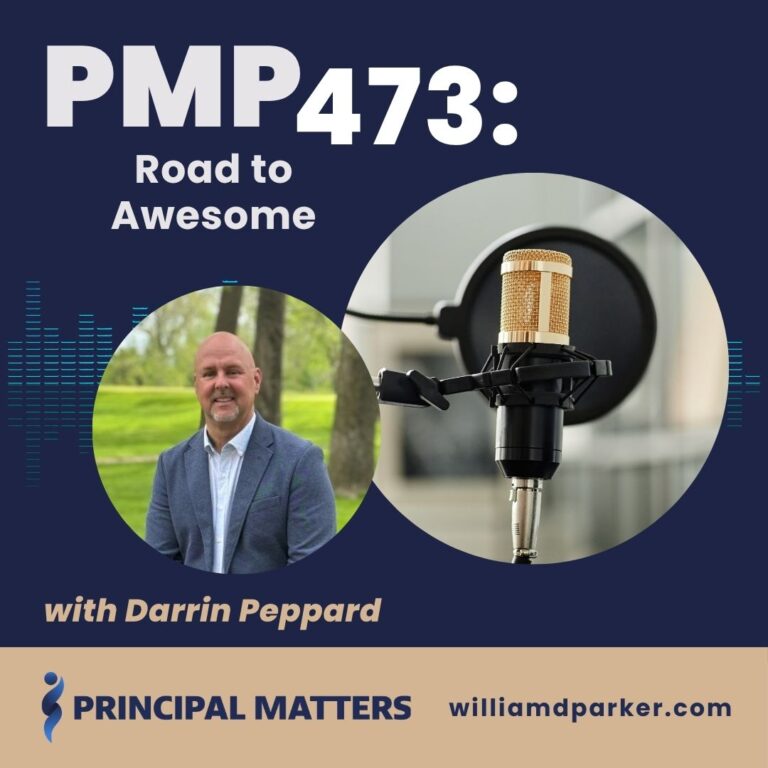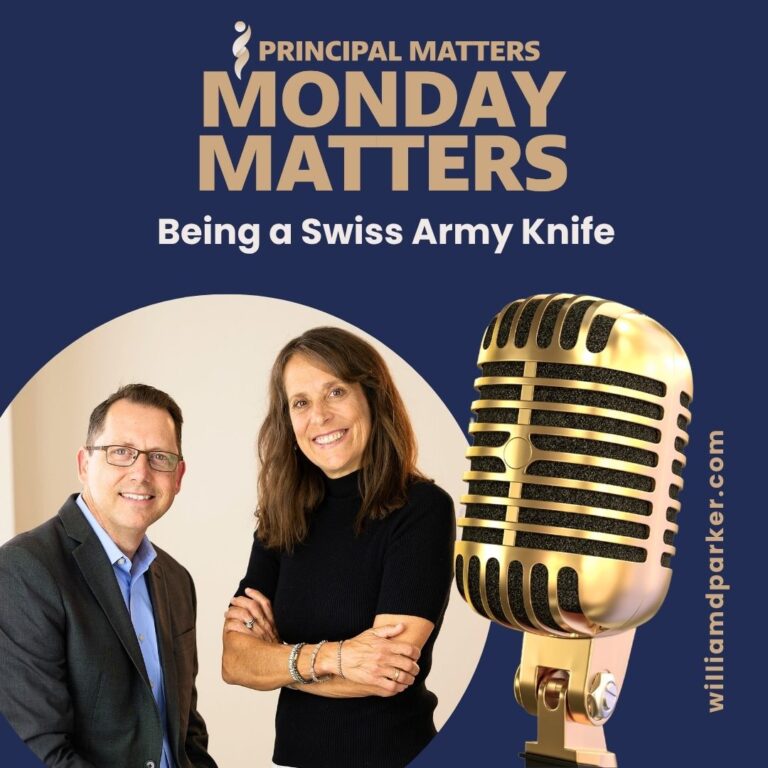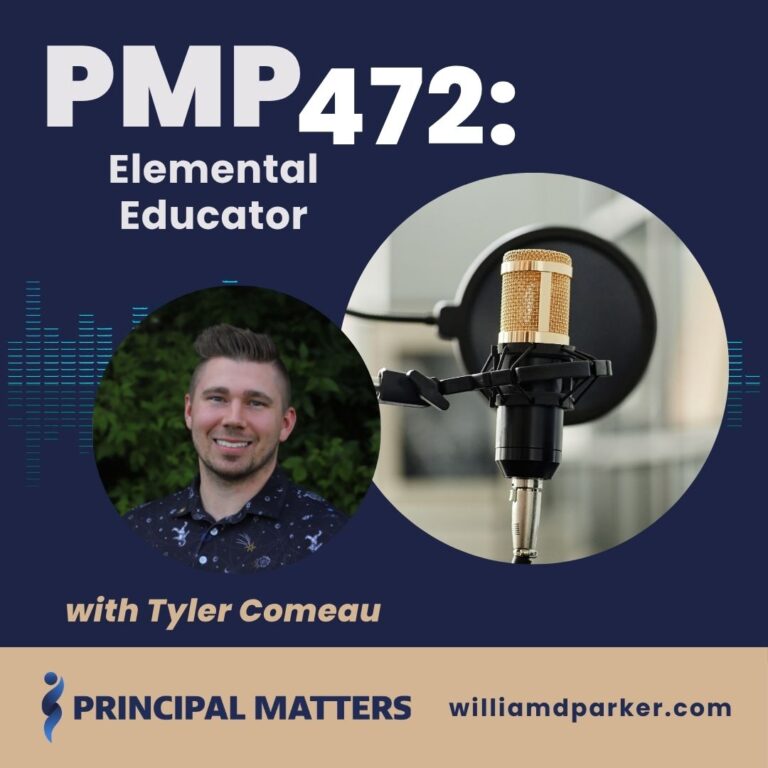Podcast: Play in new window | Download
I was listening to an interview between Daniel Bauer and Jethro Jones the other day on Daniel’s Better Leaders, Better Schools podcast.
Daniel asked Jethro, an Alaska principal, “What is one of your regrets from your time at your school?” I really liked Jethro’s response because he focused on how relationships were such an important part of his work, and he wished he had been able to better bridge the gap with some of his colleagues.
As important as it is to celebrate our wins with students, it is also a good reality check at times to reflect on where we wish we could improve.
Unfortunately, when I think of most of my biggest regrets in school leadership, they are usually the ones I can’t talk about because of confidentiality. Having spent eleven years in the classroom, and nine years as an assistant principal before serving the last four years as a high school principal, the bulk of my conflicts also seem to be ones that involve relationships.
When I think about my teaching, I don’t think back with a lot of regret about my curriculum decisions—although I always had room for improvement. And I don’t feel regret for the duties or responsibilities I have managed in school administration—although I always have room for improvement there too. But when I think about regrets in my work, they almost always center on time when differing perspectives caused conflict, misunderstanding, disagreement or let-downs.
Here’s a small example: One time when I was still in the classroom, I held a parent conference with a mother who told me that her son came home upset when I refused to give him credit for a test question he said he had marked correctly on a test.
When he had brought the test to me, it appeared he had erased and rewritten the answer after I had passed back the test. I told him I couldn’t give him credit at that point because it was too late for me to know whether had corrected it or I had marked it incorrectly after I had passed it back. She said my assumption that he had practiced academic dishonesty was crushing for him; he had great respect for me, and it hurt him that think I did not trust him.
This was a situation I can reflect back on now and see both sides. One the hand, this mom had not seen the interactions I had observed where students would attempt to hide notes under desks during assessments, or others who had tried to share copies of tests with classmates via their phones.
At the same time, I was young teacher. And I had gone over the answers with students after I passed back the test. This was a good instructional practice, but I didn’t think about asking them to put away writing utensils while we reviewed their answers so that we wouldn’t have any questions about whether or not answers were changed during review.
Also, I’m sure I didn’t think about how to address the situation without seeming dismissive. This was likely a twenty-second interaction with a student that frankly I never thought about afterwards until the mother brought it up. And as she explained it to me very politely—not because she wanted his points corrected but because she wanted me to know how much my opinion of her son mattered to him—I began to think I probably missed it with that student.
When I think back to that situation now twenty years later, I don’t regret that I made a judgment call with the best information I had at the time. But I do regret that I was unaware of how powerful a 20-second interaction could be with a student.
The good news is that I took the mother’s story to heart so that I became more mindful in my interactions with students. The bad news is that I may have made the same mistake a thousand times and not even noticed it.
The Power of our Words
Last night I was attending a principal advocacy meeting in Washington, D.C. This is the time of year when principals will visit to ask elected officials to continue support for schools. As I was eating dinner, I noticed one of the workers serving dinner was wearing a badge from a local culinary school. His name was Thomas. Because I love to learn, I asked Thomas how he became involved in the industry.
Over the next ten minutes, he shared with me that he grew up in an urban area of D.C. He was from a poor neighborhood “…where most boys weren’t expected to live past the age of 17 because of gang violence,” as he explained. When he was fourteen years old, his mother sent him to live with his brother in San Diego. While he was there, he studied hard and graduated high school. But when he moved back to Washington, D.C., he made decisions that resulted in addiction and joblessness. This past year, he checked into rehab. While there he was given the chance to train with a local culinary school.
Now that he’s finished, he told me he is clean and happily employed. When he finished his story, I told Thomas how proud I am of him. Then I told him I’m school principal, and I asked him, “If you had a message for educators who have students like you were in school, what would you tell them?”
He thought for a second, and then he said, “If I could deliver any message, it would be to my teacher, Ms. LeGong, who taught me in San Diego. She has retired and I don’t know where she is now. But I would tell her, ‘Thanks for never giving up on me.’ She always believed in me and told me she knew I could finish school and be successful in life. It’s taken me a lot of years to believe that, but I’d want to tell her thanks.”
Obviously, if I could find Ms. LeGong, I would tell her this message from Thomas. (If anyone knows a Ms. LeGong in the San Diego area, please pass along this message to her.) But I bet it’s safe to say that Ms. LeGong probably was a great teacher. I hope as she looks back at her years in the classroom, she doesn’t regret her work. I hope she knows that no matter how many mistakes she made, or how many wrong calls she had over the years, there was a young man who heard her message. He may be a on the other side of the country now, but he still remembers.
My Own Moment of Reward
Although it is easy to remember lessons we learn through the wins and losses of our work, it is an encouragement when we catch a glimpse of how the lives of students can be influenced by our service. A few weeks ago, I was at my desk when an email popped up from a former student. Her name is Erin and she now works for the Air Force as an historian.
Here is an excerpt from her email:
Good Afternoon Mr. Parker,
I hope I was one of those students who sticks out in your mind because you always thought, “She’s going to make something of herself.” If not, twenty years ago I was in your creative writing class at South Intermediate…
I wanted to send you a maybe not too quick email about the recent events in my life and how you share some of the blame. In December 2015 I graduated with a BA in history. I did pretty well since a history degree is mainly reading, researching, and writing and I still have a very fond passion for writing. Not knowing what to do with my new achievement, I started looking on USA Jobs for a career and found one with the United States Air Force as a historian.
After my internship I will be transferred to an AF Wing to run my own history office. I will be responsible for writing the annual history, researching whatever needs researching, overseeing heritage projects, and doing pretty much whatever the commander asks…
All that a side, I wanted to tell you a lot of this happened because of the confidence you gave me when I was a freshman at South. It was your writing class which gave me the opportunity and courage to share and improve my writing. My grammar may be lacking, but I am better able to paint pictures with my words—a talent many historians are without…That courage you nurtured enabled me to better articulate my thoughts, write entertaining history, and even inspire others.
A few months ago I was asked to present a speech to a few hundred people and, what came natural to me and didn’t seem that difficult to accomplish, made others rethink the purpose of their careers and life. I actually have strangers come up to me in the halls at work wanting to shake my hand as if
I invented Jello pudding. I received a thank you card from a two star general who credited me with the success of the event…My boss had me expound on the speech and had it published in our Air Force History and Museum Program newsletter.It’s all a bit overwhelming because it was not that difficult. It was easy. I sat down,
wrote a few pages, and that was it. Maybe the presentation part was terrifying, but the writing portion was cake. That came from you and your class. Without either I would have given up on writing a long time ago. I hope things are well for you in Skiatook…Once again, thank you.
Not only was that email so touching, but it is also so encouraging to see the growth and influence this young woman is now making in her own world.
Let’s Wrap This Up
Today I sat in a room with over a hundred principals or school leaders who represented schools from all over the country. Each one of them has a unique story about his or her school. These are men and women who love their students, who are passionate about supporting teachers, and who are willing to travel long-distances to have uncomfortable conversations with elected officials about why we need strong support for schools.
But I bet each of us has something in common with my experience. I bet they have stories of regret and stories of gratitude. As school leaders, each of us makes decisions everyday that will affect whether or not others have the kind of environment and opportunity they need to be successful in school.
Here’s my question for each of us: When is the last time you reflected on the influence you may be having on others?
You may be managing personnel decisions or implementing policies for student discipline. Or you may be guiding choices on curriculum or instruction. Whatever the tasks ahead, don’t forget that at the end of the day, the moments that matter most will often be the small moments. It may even be a 20-second conversation–a word of encouragement you offer a teacher or student. Or maybe it’s a reminder you give someone that he or she is talented and has something to offer the world. It may be a program you’ve helped develop.
As you think about the work ahead, I’d like to encourage you to “be in the moment” today. No matter what pressures you face throughout your school, keep in mind that there are others whose lives are simply or sometimes radically influenced when they know you believe in them, want the best for them and provide opportunities for them to learn.
Now It’s Your Turn
Where are places in your own leadership where you recognize room to grow? Don’t be afraid to let others show you your blind spots. But also take time to reflect on the small ways these lessons can help you encourage or influence others to keep striving. Don’t be afraid to learn from regrets, but also stay motivated by the moments of gratitude each of us needs to remember as well.
Sign-Up For Free Updates and Ebook
When you enter your email address here, you will automatically receive my newest posts and a free Ebook, 8 Hats: Essential Roles for School Leaders. Let’s keep learning together!
Principal Matters–The Book!
School leaders are very busy, so each of the twenty-four chapters is designed as a quick-read and followed with take-action questions for follow-up or reflection. If you want practical ideas on understanding your purpose, managing school teams, dealing with challenges, and leading with courage, action, motivation, and teamwork, go HERE to pick up a copy for you or your team.




